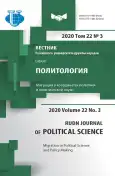French Model of Integration of Immigrants Facing the Modern Challenges
- Autores: Preobrazhenskaya A.A.1
-
Afiliações:
- Primakov National Research Institute of World Economy and International Relations, Russian Academy of Sciences
- Edição: Volume 22, Nº 3 (2020)
- Páginas: 487-505
- Seção: MIGRATION AND POLITICAL TRANSFORMATIONS IN EUROPE
- URL: https://journal-vniispk.ru/2313-1438/article/view/322177
- DOI: https://doi.org/10.22363/2313-1438-2020-22-3-487-505
- ID: 322177
Citar
Texto integral
Resumo
Article examines specifics of French model of integration of immigrants, as well as the evolution of integration practices. It is shown that integration model was based initially on principles of assimilation, and ethnic and religious identity of the migrants was not taken into account. It is established that current model of integration does not require cultural unification, but does not allow institutionalization of immigrant communities as representatives of interests of migrants. Author concludes that the reasons for re-Islamization, which mainly affected second and third generation of migrants, were structural transformations in economy, as well as an increase in the number and geography of migration flows. Article analyzes factors that contributed to formation and spread of ethno-religious communities in the country, as well as driving forces that led to the rise of Islamist radicalism and surge of terrorist acts. Special attention is given to the problem of interaction of a secular, democratic state and society with Islam, a significant part of whose adherents belong to different socio-cultural paradigm than the indigenous population. Author focuses on current political initiatives of President Macron, to demarginalize urban suburbs, as well as measures taken to structure Islam in France and counter Islamist radicalism. In this research, author uses a political and cultural approach that integrates methods of sociology, socioculturology, psychology, which makes it possible to study socio-cultural dimension of politics, symbolic aspect of public life, as well as restores the role and significance of human person as the main actor in political process.
Palavras-chave
Sobre autores
Arina Preobrazhenskaya
Primakov National Research Institute of World Economy and International Relations, Russian Academy of Sciences
Autor responsável pela correspondência
Email: arina-preob@mail.ru
PhD, Senior Researcher, the Center for Comparative Social-Economic and Political Studies
23 Profsoyuznaya St, Moscow 117997, Russian FederationBibliografia
- Novozhenova I.S National identity in the era of globalization. In: France in search of new ways. Ed. Yi. Rubinskiy. M.: Ves mir; 2007: 27–68. (In Russ.).
- Kondratieva T.C., Novozhenova I.S Immigrants in Europe: Integration model. Urgent problems of Europe. 2006. Vol. 1: 9–59. (In Russ.).
- Fourquet J. “The French archipelago”: a multiple and divided nation. Paris: Seuil; 2019. (In French).
- Laurence J., Vaisse J. Integrating islam. Paris: Odile Jacob; 2007. (In French).
- Shnapper D. What is integration. Paris: Gallimard; 2007. (In French).
- Lapina N.Yu. French society facing the challenges of globalization: analytic review. М.: RAN INION, 2019. doi: 10.31249/franceglob/2019.00.00 (In Russ.).
- Smith T. B. Unfair France: 1975-2006: why the French social model no longer works. Paris : Autrement, 2006. (In French).
- Kepel G. Suburb of the Republic. Society, politics and religion in Clichy-sous-Bois and Montfermeil. Paris : Gallimard, 2012. (In French).
- Tribalat M. Assimilation: the end of the French model. Paris: Toucan; 2013. (In French).
- Eremina N.V., Chikhachev A.Y. From “Open Door Policy” to Migrant Crisis: the Reforming of Migration Policy in European and National Dimensions (the Examples of Great Britain and France). Comparative Politics Russia. 2016; 7(4(25)): 36–61. (In Russ.). URL: https://doi.org/10.18611/2221-3279-2016-7-4(25)-36-61
- New factors of global and regional development: aggravation of ethnic and socio-cultural contradictions. In: Gontmakher E.C., Zagladin N.V., Semenenko I.S., eds. М.: Primakov National Research Institute of World Economy and International Relations, Russian Academy of Sciences; 2013. (In Russ.).
- Integration of migrants with different cultural background: prospects of interculturalism. Tsapenko I.P., Grishin I.V., eds. М.: Primakov National Research Institute of World Economy and International Relations, Russian Academy of Sciences; 2018. (In Russ.).
- Dolgov B.V. Arabic-Moslem community in France. М.: Lenand; 2017. (In Russ.).
- Galland O., Mixel A. The radical temptation. Survey of high school students. Paris: PUF; 2018. (In French).
- Chernega V.N. France: Crisis of migrants’ integration policy. Urgent problems of Europe. 2016. Vol. 4: 140–156. (In Russ.).
- Obichkina E.O. Political Crisis in France: «Gilets Jaunes» and the End of the «First Period» of the Emmanuel Macron’s Governance. MGIMO Review of International Relations. 2019; (2(65)): 101–135. (In Russ.). URL: https://doi.org/10.24833/2071-8160-2019-2-65-101-135
- Rubinskiy Yu. Sign of time Vol. 2. France: unfinished modernization. М.: Institute of Europe, Russian Academy of Science; 2018. (In Russ.).
- Bacqué M-H., Bellanger E., Rey H. (dir.) Popular suburbs. Territories, societies, policies. Paris: Éditions de l’Aube; 2018. (In French).
- Preobrazhenskaya A. The French model of integration of immigrants: test of time. Human. Community. Management. 2017. Vol. 18 (3): 18–36. (In Russ.).
- Felousis G. The French education system in the OECD: what performance? Cahiers francais. 2012. Vol. 368: 9–12. (In French).
Arquivos suplementares









